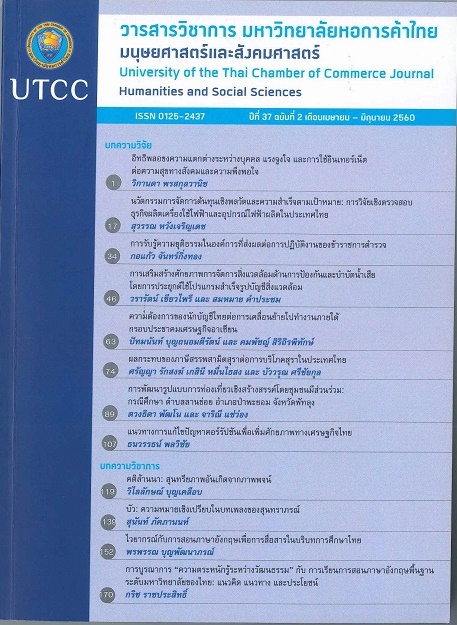Thai Accountants’ Demand for Work Relocation under ASEAN Economic Community (AEC) Arrangement
Main Article Content
Abstract
The ASEAN Economic Community (AEC) was officially established at the end of past 2015 with a free labor mobility arrangement enforced under the Mutual Recognition Arrangement (MRA). The purpose of this research is to identify the factors affecting the demand of Thai accountant-related professionals to work within ASEAN-member countries. The study shows 68.46% of respondents having no interest in working as accountants in ASEAN countries. Of all the reasons, 53.57% of them lack proficiency in English, 46.79% are satisfied with their present salaries and fringe benefits in Thailand, and 46.43% have family and age constraints. Of all the respondents, 31.54% are interested in working with firms in AEC. Of these, 77.51% prefer to have working experience abroad, 69.99% are to have higher salaries, and 69.77% expect professional progress. Topping those who are interested in work relocation are management accountants. In contrast, tax accountants demand smallest work relocation, due to different tax laws and regulations within ASEAN countries. Besides, 73.64% of Thai accountants prefer to work in Singapore and 37.98% would like to work in Malaysia. At a 0.05 level of significance, sex, status and age have strong influence on work relocation decision while education has insignificant influence.
Article Details
ลิขสิทธิ์ของบทความ
ผลงานที่ได้รับการตีพิมพ์ถือเป็นลิขสิทธิ์ของมหาวิทยาลัยหอการค้าไทย ห้ามมิให้นำเนื้อหา ทัศนะ หรือข้อคิดเห็นใด ๆ ของผลงานไปทำซ้ำ ดัดแปลง หรือเผยแพร่ ไม่ว่าทั้งหมดหรือบางส่วนโดยไม่ได้รับอนุญาตเป็นลายลักษณ์อักษรจากมหาวิทยาลัยหอการค้าไทยก่อน
References
Education First. (2015). English proficiency index. Retrieved November 4, 2015, from
https://www.ef.co.th/epi/regions/asia/thailand/
Federation of Accounting Profession. (2013a). Annual report 2013. Retrieved from
https://eservice.fap.or.th/files/annual_report/annual-report_2556-2557.pdf (in Thai).
Federation of Accounting Profession. (2013b). ASEAN MRA Framework on Accountancy Services. Retrieved November 4, 2015,from https://www.fap.or.th/index.php?lay=show&ac=article&Id=539692073&Ntype=44 (in Thai).
Gilmer,V.B. (1966).Applied psychology: Problems in living and work. New York:McGraw-Hill.
Limsukhon, P., & Phadoongsitthi, M. (2011). 3GD )NA R@SHRE@BSHNM NE @BBNTMSHMF personnels. Journal of Accounting Profession, 7(20), 50-65. (in Thai).
Naveekarn, S. (2004). Organizational development and motivation. Bangkok,Thailand: Bhannakij. (in Thai).
Paitoonpong, S. (2010). The study analyzes labor mobility between industry and profession. Retrieved from https://tdri.or.th/research/ (in Thai).
Prugh, C.C. (1994). How to jumpstart a stalled career. Lincolnwood, IL: National Textbook
Sritarapipat, A. (2014). Thai accountants in the age of AEC. University of the Chamber of Commerce Journal, 34(2), 115-134. (in Thai).
Suwanvalaikorn, W., & Phadoongsitthi, M. (2013). The expectation and readiness of Thai auditors to compete in the ASEAN economic community. Journal of Accounting Profession, 9(25), 35-49. (in Thai).
Teukar, D. (2011). Role of human resources management and AEC. Retrieved November 2, 2015, from https://www.hrm-excellence.com/index.php/component/content/article/220--m---m-s (in Thai).
Thailand did not stop the brain drain, Wages are the main cause for motivation.(2011.July 21). Manager Online. Retrieved from https://www.manager.co.th/iBizChannel/5HDV-DVR@ROW?NewsID=9540000090013 (in Thai)
Theasiriphet, C. (2010). A comparative study of the accounting profession between Thailand, Singapore and India. Journal of Accounting Profession, 6(15), 51-68. (in Thai).
University of the Chamber of Commerce, Center for International Trade Studies. (2012).An analysis of the competitiveness of professional labor from service sector liberalization under the ASEAN economic community. Retrieved December 7, 2015, from https://www.citsonline.utcc.ac.th/index.php/th/articles/-2555/1904--2 (in Thai).
Vanichbancha,K.(2011).SPSS for windows (18thed). Bangkok, Thailand: Chulalongkorn University Press. (in Thai).
Walton,R.E.(1975). Improving the quality of work life. Harvard Business Review, 7(3),14-16.
Wyatt, T.A., & Wah, C.Y. (2001). Perceptions of QWL: A study of Singaporean employees development. Research and Practice in Human Resource Management,9(2), 59-76.

